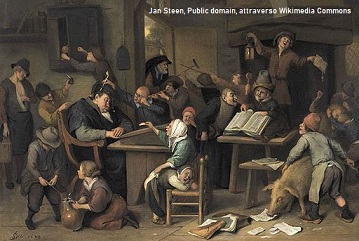Esperienze di didattica collaborativa nella Terza Missione: lingua tedesca per la formazione continua
DOI:
https://doi.org/10.54103/2035-7680/17881Keywords:
Third Mission; lifelong learning; German language; situated learning; cooperative learning; assessmentAbstract
The aim of this contribution is to investigate to what extent the sudden switch to distance learning and teaching in response to the Covid-19 pandemic impacted on the relation between the university system and the social fabric, in particular with respect to lifelong learning, a central component of the Third Mission. The starting point for the considerations which will be the carried out is the course for external users “German Language for Specific Purposes”, which was held in January and February 2021 at the University of Verona in the realm of the departmental Project of Excellence and the MultilinVR project. The outbreak of pandemic has made the educational role of university towards the different social actors even more significant, since they have been experiencing new goals and motivations, which have evolved and rephrased along with the modified social conditions. After having considered the educational needs of the participants, we will discuss the strategies which allowed for cooperative and situated learning – both in synchronous and asynchronous classes – and we will show how interaction was a deciding factor for this lifelong learning proposal to be effective. Moreover, the role and the forms of assessment will be analysed, as it assumes a function which is relevantly different from the objectives it pursues for canonical university students.
Metrics
References
ANVUR. AVA. Autovalutazione, Valutazione Periodica e Accreditamento, 2013. https://www.anvur.it/attivita/ava/. Consultato il 14 sett. 2021.
ANVUR. “La Terza Missione nelle università.” Rapporto ANVUR, 2013, pp. 559-583, http://www.anvur.it/attachments/article/882/8.Rapporto%20ANVUR%202013_UNI~.pdf. Consultato il 14 sett. 2021.
ANVUR. Terza Missione/Impatto. Terza Missione e Impatto Sociale di Atenei ed Enti di Ricerca, 2020. https://www.anvur.it/attivita/temi/. Consultato il 14 sett. 2021.
Bönsch, Manfred. “Methodik der Differenzierung.” Die Berufsbildende Schule, vol. 60, no. 11/12, 2008, pp. 324-328.
Calvani, Antonio. Manuale di tecnologia dell'educazione: Orientamenti e Prospettive. ETS, 2004.
Celletti, Alessandra. “Terza Missione e impatto nella valutazione della qualità della ricerca.” Anvur, 26 feb. 2021, https://www.anvur.it/wp-content/uploads/2021/02/Terza-Missione-Alessandra-Celletti.pdf. Consultato il 27 gen. 2022.
Compagnucci, Lorenzo, e Francesca Spigarelli. “The Third Mission of the university: A systematic literature review on potentials and constraints.” Technological Forecasting and Social Change, vol. 161, 2020. https://doi.org/10.1016/j.techfore.2020.120284.
Demmig, Silvia. Das professionelle Handlungswissen von DaZ-Lehrenden in der Erwachsenenbildung am Beispiel Binnendifferenzierung. Iudicium Verlag, 2007.
DiLLS – Progetto di Eccellenza. Le Digital Humanities applicate alle lingue e letterature straniere (2018-2022), https://dh.dlls.univr.it/it/. Consultato il 14 sett. 2021.
DW – Deutsch Lernen. Einstufungstest, https://learngerman.dw.com/de/placementDashboard. Consultato il 24 mar. 2022.
Faiella, Filomena. “Metodologie di scaffolding per il blended learning.” Form@re, vol. 39, no. 2, 2005.
Glatthorn, Allan. Performance Standards and Authentic Learning. Eye on Education, 1999.
Jonassen, David. “Thinking Technology, Toward a Constructivist Design Model.” Educational Technology, vol. 34, no. 4, 1994, pp. 34-37.
Kaufmann, Susan. “Heterogenität und Binnendifferenzierung im DaZ-Unterricht.” Fortbildung für DaZ-Kursleitende, a cura di Susan Kaufmann et al., Hueber, 2007, pp. 186-214.
Krashen, Stephen. Principles and Practice in Second Language Acquisition. Pergamon, 1982.
Lave, Jean, e Etienne Wenger. Situated Learning. Legitimate peripheral participation, Cambridge University Press, 1991.
Martin, Nicole D., et al. “Fading distributed scaffolds: the importance of complementarity between teacher and material scaffolds.” Instructional science vol. 47, no. 1, 2019, pp. 69-98.
MultilinVR. https://www.multilinguismoverona.eu/. Consultato il 24 mar. 2022.
Smidt, Hanne, e Andrée Sursock. Engaging in lifelong learning: shaping inclusive and responsive university strategies. European University Association, 2011.
Viola, Filippo. “L’università come azienda, il sapere come merce.” Proteo, vol. 1, 2006.
http://www.proteo.rdbcub.it/article.php3?id_article=472. Consultato il 14 sett. 2021.
Vygotskij, Lev. Pensiero e linguaggio. Ricerche psicologiche, Laterza, 1990.
Wood, David, et al. “The role of tutoring in problem solving.” Journal of Child Psychology and Psychiatry, vol. 17, no. 2, 1976, pp. 89-100.
Downloads
Published
How to Cite
Issue
Section
License

This work is licensed under a Creative Commons Attribution-NonCommercial-NoDerivatives 3.0 Unported License.




